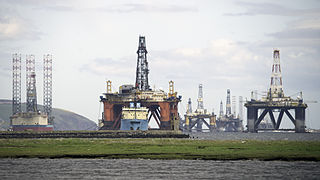(Bloomberg) -- Leaders of the world’s largest suppliers of offshore drilling rigs and the services that go with them see the oil market recovery taking even longer than expected last year.
Transocean Ltd. Chief Executive Officer Jeremy Thigpen expects it will have to wait at least another three years before his company can begin charging higher rates for offshore rigs. Schlumberger Ltd. chief Paal Kibsgaard sees the oil industry, stuck in the deepest financial crisis ever, in no rush to get rigs back online even after prices recover.
Before rig owners can charge more, they must first see a boost in activity after the worst crude market crash in a generation. Transocean doesn’t expect an increase in rig leases until late next year or sometime in 2018, Thigpen said Monday in an interview at the Scotia Howard Weil Energy Conference in New Orleans. Daily rates, which have fallen by more than half over the past two years, aren’t expected to climb until 2019 or 2020, he said.
"I think ’16 and ’17 are going to be tough," said Thigpen, who joined the Vernier, Switzerland-based company 11 months ago. "We’re taking the necessary steps to navigate our way through the downturn, but we’re also preparing for that eventual recovery."
Transocean shares sank as much as 5.7% in New York trading and were 4.7% lower at $10.04 as of 10:22 a.m. Tuesday.
Fragile State
The fragile financial state of oil explorers means there will be a noticeable lag from when oil prices climb and when exploration and production companies invest again, Kibsgaard said in a presentation to investors at the conference.
Profitability and cash flow are "at unsustainable levels for most oil and gas operators which in turn has created an equally dramatic situation for the service industry," he said. "Going forward, the industry is likely facing a ‘medium-for-longer’ oil-price scenario, subject to periods of volatility, as the national oil companies within OPEC can still generate significant returns for their owners in such an environment due to the low cost base of their conventional resources."
Rig contractors have suffered through the double blow of declining customer demand due to tumbling oil prices and a glut of vessels that continue to be built to meet orders made before the rout.
Transocean leads the industry in reducing its fleet, with 24 rigs scrapped since the downturn began and another eight to 10 it could retire over the next year to 18 months, Thigpen said. Transocean currently has 61 rigs in its fleet with another 11 under construction.
Financial Liquidity
The company reported $2.3 billion in cash at the end of last year. Thigpen said he has "no real concerns" with Transocean’s financial liquidity through the end of 2018, and the company has a number of levers it can pull beyond that if needed.
Schlumberger said Monday it expects revenue in the first quarter to fall to $6.5 billion, a 16% drop from the final three months of last year. That’s a larger drop than the $7 billion average of 25 analyst estimates compiled by Bloomberg. The Houston- and Paris-based company said it’s not expecting a meaningful recovery in its own activity until next year.
Other U.S. oil-industry executives echoed the cautious sentiment:
Anadarko Petroleum Corp.’s CEO Al Walker said in a presentation increasing demand will signal that higher prices are likely to be sustained. Weatherford International Ltd. plans to reduce headcount by another 6,500 after cutting 14,500 jobs in 2015. CEO Bernard Duroc-Danner said he sees the North American market bottoming in the second quarter of the year. Apache Corp. is unlikely to pursue acquisitions until more companies in the industry have gone through restructuring, CEO John Christmann said in an interview. Continental Resources Inc. will consider various actions every time oil prices gain another $5 per barrel and hold there, its President Jack Stark said Monday in an interview. Those actions include paying down its debt, finishing its inventory of wells that were drilled but not completed, and then finally putting new drilling rigs online, he said.




